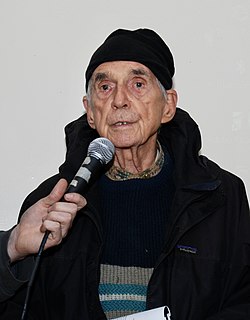A Quote by Meghan O'Rourke
Loss doesn't feel redeemable. But for me one consoling aspect is the recognition that, in this at least, none of us is different from anyone else: We all lose loved ones; we all face our own death.
Related Quotes
When you go through hell, your own personal hell, and you have lost - loss of fame, loss of money, loss of career, loss of family, loss of love, loss of your own identity that I experienced in my own life - and you've been able to face the demons that have haunted you... I appreciate everything that I have.
A lost sheep is, for all practical purposes a dead sheep. It is the admission that we are dead in our sins---that we have no power of ourselves either to save ourselves or to convince anyone else that we are worth saving. It is the recognition that our whole life is out of our hands and that if we ever live again, our life will be entirely the gift of some gracious shepherd. God finds us the desert of death (not in the garden of improvement) and in the power of Jesus' resurrection, he puts us on his shoulders rejoicing and brings us home.
Of course, let us have peace, we cry, "but at the same time let us have normalcy, let us lose nothing, let our lives stand intact, let us know neither prison nor ill repute nor disruption of ties ... " There is no peace because there are no peacemakers. There are no makers of peace because the making of peace is at least as costly as the making of war - at least as exigent, at least as disruptive, at least as liable to bring disgrace and prison, and death in its wake.
It is abundantly evident that, however natural it may be for us to feel sorrow at the death of our relatives, that sorrow is an error and an evil, and we ought to overcome it. There is no need to sorrow for them, for they have passed into a far wider and happier life. If we sorrow for our own fancied separation from them, we are in the first place weeping over an illusion, for in truth they are not separated from us; and secondly, we are acting selfishly, because we are thinking more of our own apparent loss than of their great and real gain.
If we are to be the last of the White men who conquered the world; if we are finally to be overwhelmed by a pack of rats, let us at least face the death of our race as our ancestors faced their death - like man. Let us not crawl down amongst the rats begging for mercy or trying to out-sneak them and pretend to be rats ourselves!
Nothing helps us build our perspective more than developing compassion for others. Compassion is a sympathetic feeling. It involves the willingness to put yourself in someone else's shoes, to take the focus off yourself and to imagine what it's like to be in someone else's predicament, and simultaneously, to feel love for that person. It's the recognition that other people's problems, their pain and frustrations, are every bit as real as our own-often far worse. In recognizing this fact and trying to offer some assistance, we open our own hearts and greatly enhance our sense of gratitude.
Photography is linked with death in many different ways. The most immediate and explicit is the social practice of keeping photographs in memory of loved beings who are no longer alive. But there is another real death which each of us undergoes every day, as each day we draw nearer to our own death. Even when the person photographed is still living, that moment when she or he was has forever vanished.







































